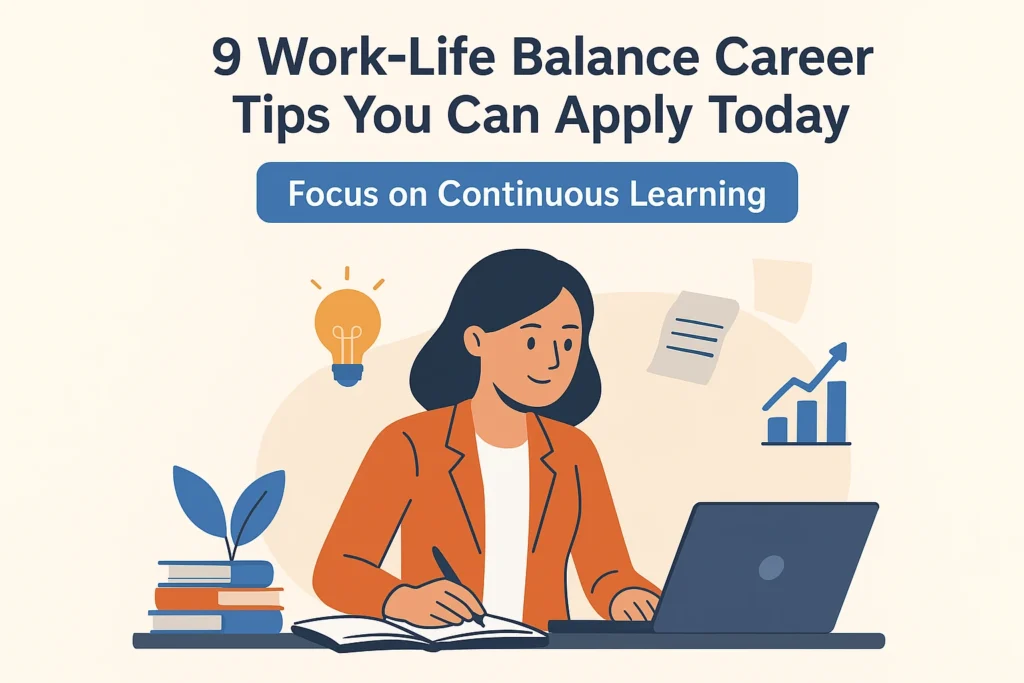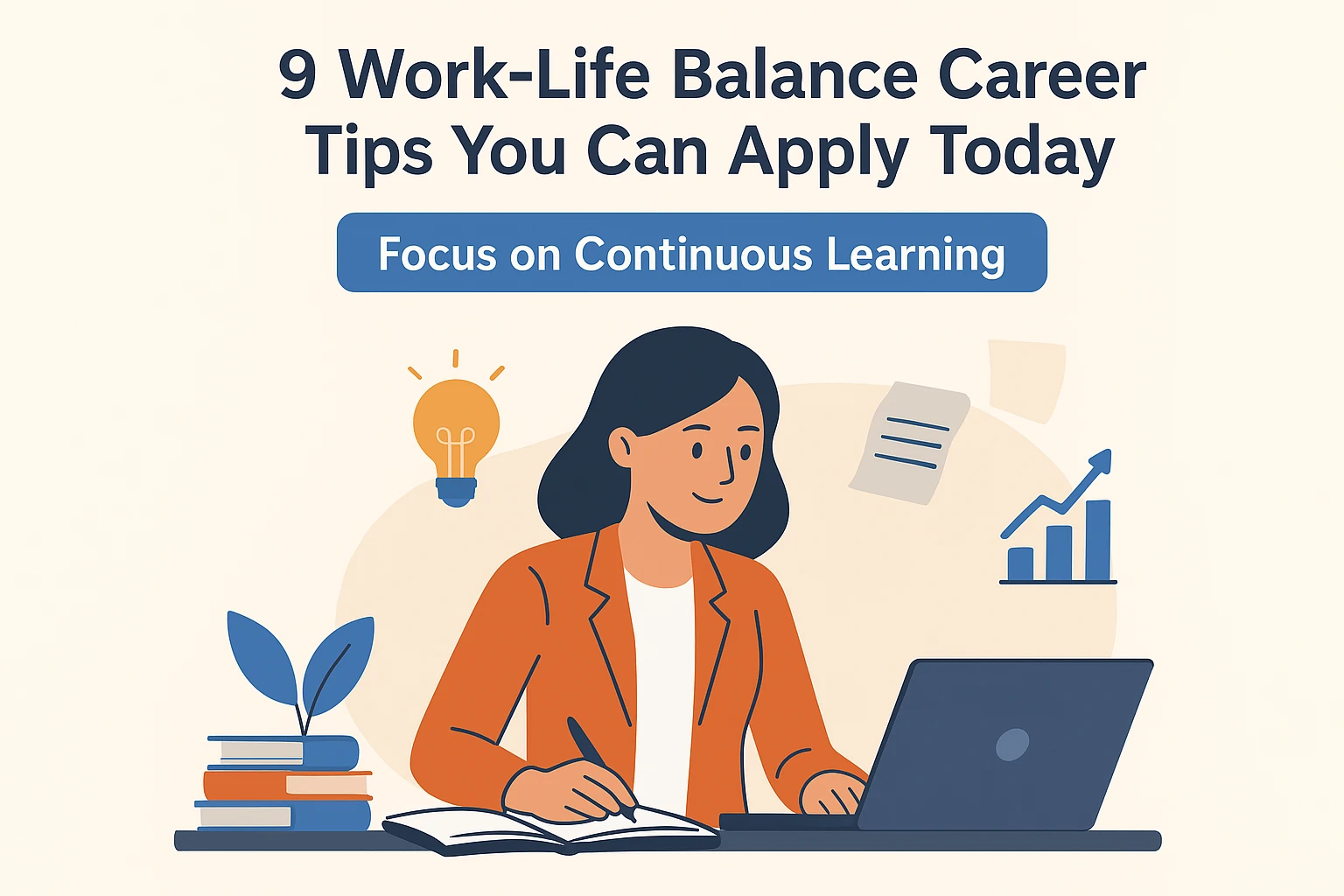Introduction: The Modern Struggle with Work-Life Balance
Picture this: It’s 9 p.m., and you’re still answering emails while your family waits for dinner. Or maybe you’ve promised yourself a gym session, but another late-night meeting eats up that time. Sound familiar?
In today’s fast-paced, always-connected world, balancing work and personal life has become harder than ever. Remote work, smartphones, and endless deadlines blur the lines between professional and personal time. The result? Stress, burnout, and the feeling that you’re never fully “off the clock.”
But here’s the good news: achieving work-life balance is possible. With the right strategies, you can reclaim your time, boost productivity, and still enjoy the moments that truly matter. In this guide, you’ll discover 9 actionable career tips to create a healthy balance between professional success and personal well-being.

1. Set Clear Boundaries Between Work and Personal Life
One of the most powerful work-life balance tips is setting boundaries. Without them, work easily spills into your personal world.
Practical Steps:
- Define work hours and stick to them.
- Create a dedicated workspace (even a small desk corner).
- Silence notifications outside office hours.
- Communicate boundaries to your team and family.
Benefits:
Boundaries prevent burnout, help you recharge, and improve focus during work hours. For example, logging off at 6 p.m. gives you time for dinner with family, while your mind resets for the next day.
2. Prioritize Tasks with Smart Time Management
Not all tasks deserve equal attention. Prioritization ensures you focus on what matters most.
Practical Steps:
- Use the Eisenhower Matrix (urgent vs. important).
- Identify your top 3 priorities daily.
- Avoid multitasking—focus on one task at a time.
Benefits:
You’ll finish important work faster, reduce stress, and have more free time. Think of it as working smarter, not harder.
3. Embrace Flexible Work Options
The rise of remote and hybrid work has shown that flexibility is the future of careers.
Practical Steps:
- Ask for flexible hours or remote options if possible.
- Align work tasks with your natural energy peaks (morning vs. evening).
- Use saved commute time for exercise or hobbies.
Benefits:
Flexibility improves productivity and reduces stress. For instance, working 7 a.m.–3 p.m. could free evenings for family, gym, or relaxation.
4. Learn to Say No Without Guilt
Overcommitting drains energy. Saying no is a skill that protects your time.
Practical Steps:
- Politely decline non-essential tasks.
- Use phrases like: “I’d love to, but I don’t have bandwidth right now.”
- Delegate when possible.
Benefits:
You’ll gain more control over your schedule and focus on high-value tasks. Saying no to one extra meeting may mean saying yes to an evening walk with your partner.
5. Invest in Physical and Mental Wellness
A healthy work routine isn’t complete without wellness. Your body and mind fuel your performance.
Practical Steps:
- Add 20–30 minutes of daily exercise.
- Practice mindfulness or meditation.
- Stick to consistent sleep schedules.
- Eat balanced meals instead of skipping lunch for work.
Benefits:
Exercise reduces stress, mindfulness sharpens focus, and sleep boosts energy. Professionals who prioritize wellness perform better and avoid burnout.
6. Use Technology Wisely (But Don’t Become a Slave to It)
Technology boosts productivity—but it can also be a trap if you’re always online.
Practical Steps:
- Use apps like Trello, Notion, or Google Calendar for task management.
- Schedule “tech-free hours” daily (e.g., no phone at dinner).
- Limit social media scrolling with time-blocking tools.
Benefits:
Tech helps automate and streamline tasks but disconnecting improves mental clarity. A 30-minute digital detox daily can recharge your brain more than you think.
7. Delegate and Outsource Tasks
You don’t have to do everything yourself. Delegating is a sign of strength, not weakness.
Practical Steps:
- Hand off repetitive work to teammates or assistants.
- Outsource personal chores (like groceries or cleaning) when possible.
- Focus your energy on high-impact activities.
Benefits:
Delegation frees up time for career growth and personal well-being. Imagine outsourcing data entry so you can focus on strategic planning—or spending weekends with family instead of doing errands.
8. Cultivate Hobbies and Personal Interests
Life isn’t just about work. Hobbies recharge your creativity and happiness.
Practical Steps:
- Block weekly time for hobbies (painting, cooking, music, etc.).
- Try new experiences outside work.
- Treat hobbies as essential appointments, not optional.
Benefits:
Hobbies improve mood, boost creativity, and prevent burnout. A professional who plays guitar after work often feels refreshed and more innovative at their job.
9. Regularly Review and Adjust Your Balance
Work-life balance isn’t a one-time fix—it evolves with life changes.
Practical Steps:
- Review your routine monthly.
- Ask yourself: Am I working too much? Am I neglecting health or family?
- Adjust schedules and habits accordingly.
Benefits:
This keeps balance sustainable long-term. Small tweaks—like reducing weekend work or adding meditation breaks—can prevent bigger problems like burnout.
Common Mistakes Professionals Make (and How to Fix Them)
- Mistake 1: Believing more hours = more productivity.
Fix: Focus on quality work, not clocked hours. - Mistake 2: Skipping self-care for deadlines.
Fix: Treat wellness as non-negotiable. - Mistake 3: Trying to do everything alone.
Fix: Delegate, outsource, and ask for help. - Mistake 4: Lack of boundaries.
Fix: Define work hours and stick to them. - Mistake 5: Ignoring small daily habits.
Fix: Build consistency with micro-habits like walking or journaling.
Conclusion: Take Action Today
Work-life balance isn’t about perfection—it’s about progress. Even small changes, like logging off on time or scheduling daily walks, can transform your routine.
Start with just one tip today—whether it’s setting boundaries, exercising, or saying no to an unnecessary meeting. Over time, these small steps add up to a healthier, happier, and more successful career.
Remember: you deserve both professional success and a fulfilling personal life.
FAQs on Work-Life Balance
1. What is the #1 key to work-life balance?
Setting clear boundaries between work and personal time is the foundation.
2. Can work-life balance improve career growth?
Yes. Balanced professionals are more productive, creative, and long-term successful.
3. How do I balance work and family responsibilities?
Use time-blocking, communicate boundaries, and delegate tasks when possible.
4. Is remote work better for work-life balance?
It can be—if you set routines and avoid overworking at home.
5. What are quick daily habits for better balance?
Exercise for 20 minutes, take tech-free breaks, and plan your top 3 tasks each day.
6. Why do professionals struggle with work-life balance?
Because they lack boundaries, overcommit, and ignore self-care.
7. How can I start improving balance today?
Pick one tip from this guide—like setting a shutdown time—and commit to it.







